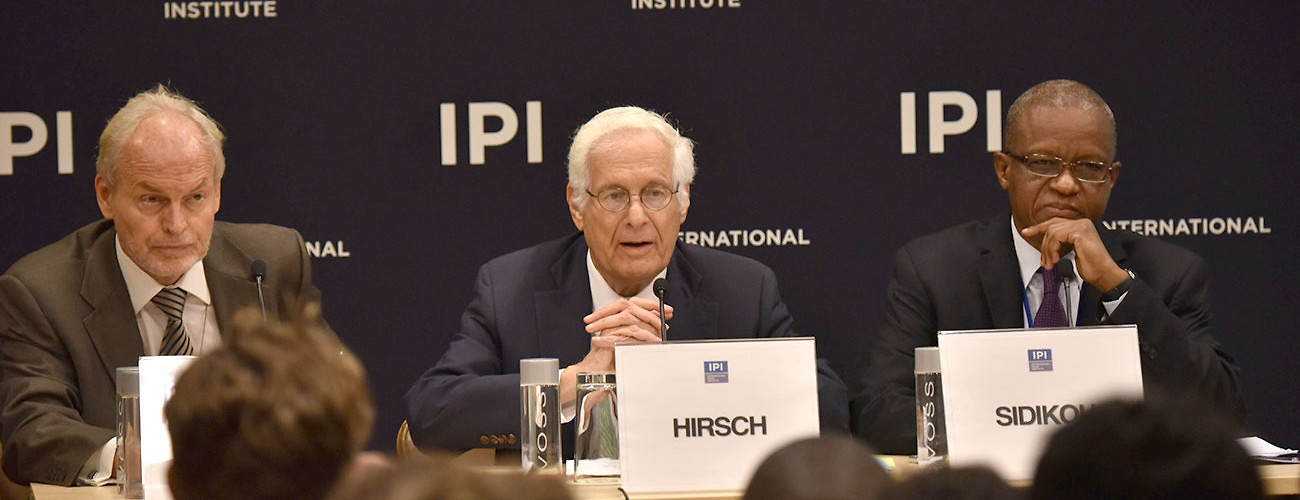Somalia, a country with no government for 21 years, has seen growing political dialogue and steps to counter violent extremism since a government was named in 2012. Yet, said Nicholas Kay, Special Representative of the Secretary-General for Somalia (UNSOM), much more remains to be done if it is to meet hopes for future elections.
Mr. Kay and Ambassador Maman Sambo Sidikou, Special Representative of the Chairperson of the African Union Commission for Somalia (AMISOM), discussed the challenges facing Somalia, including the future of the UN and AU missions, at a June 9th meeting at IPI.
In 1991, Somalia plunged into turmoil when the regime was overthrown by opposing clan groups. The country experienced decades of factional fighting after a power vacuum left it in a state of anarchy. After years of reconciliation efforts, in 2000 an interim government was formed, leading to a political process which placed benchmarks towards establishing a new constitution and a transition toward a representative government.
Mr. Kay compared the rebuilding of Somalia to building a house. The foundations of the new Somalia are the emerging federal member states, he said, the walls are the constitution and the constitutional review, and the roof is democratization and elections. These are the three stages that Somalis have set for themselves, he said.
While the project is behind schedule, there are identifiable reasons, Mr. Kay argued. The interim constitutional review and implementation commission has made little progress since it was established a year ago, due in part because it just appointed a new chair.
The constitutional review is now envisaged as a two-stage process, he said. The first is a review of largely technical aspects. The other stage is the completion of the constitutional review addressing elements which are more fundamental and difficult in terms of federalism, like resource sharing between federal states. Progress on the elections has also not been as fast as anticipated.
“We will have firm foundations by August of 2016,” Mr. Kay said. “The walls will be half finished, to be complete after 2016, and the roof will be a temporary roof… Nobody expected it to be quick or easy to rebuild that Somali house. I think if we do it in sensible, pragmatic stages and there is a strong commitment in 2016 to whatever happens—a transfer of public office, a new parliament which will elect a president—through a process that is the best possible we can achieve, then I think that would count as a success.”
“We are at a crossroads in Somalia,” Ambassador Sidikou said. “Resources are getting scarcer in the world so sometimes we tend to believe that we have to limit investments, and if we do that for Somalia, then we’re bound to repeat mistakes made elsewhere, and we’ll come to regret it.”
While he said he has seen progress made militarily in the fight against al-Shabaab, Ambassador Sidikou argued that the capabilities of the Somali Armed Forces need to be enhanced and developed.
“We must have a Somali army and police to safeguard the country,” he said. “That’s the only way to set the security conditions for stabilization in order to extend the government’s authority and legitimacy throughout the country.
He said that the security strategy for the next 18 months should be one of enabling the political process, at the national, regional, and district levels and must ensure that the national army and AMISOM’s operations go hand-in-hand.
“The nature of al-Shabaab is shifting, becoming more transnational,” Ambassador Sidikou said, referring to the Westgate Mall attacks in Kenya by al-Shabaab in September 2013 that killed 67 people and wounded 175 more. “This tells us there is a need for a concerted regional and international action to curb this new development.”
With 70% of Somalia under the age of 30, Ambassador Sidikou highlighted the importance of the youth in Somalia, arguing that the youth need hope and initiatives to shift them away from the propaganda of al-Shabaab.
The conversation was moderated by IPI Senior Adviser John Hirsch.
Watch event:








